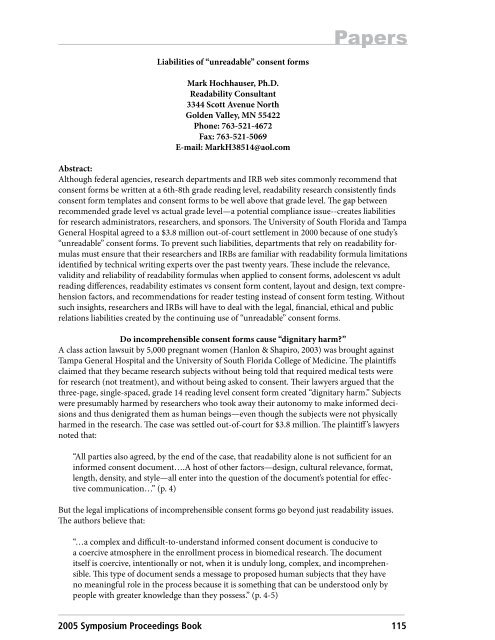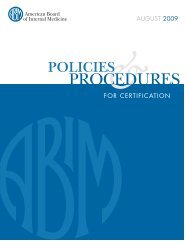The SRA Symposium - College of Medicine
The SRA Symposium - College of Medicine
The SRA Symposium - College of Medicine
You also want an ePaper? Increase the reach of your titles
YUMPU automatically turns print PDFs into web optimized ePapers that Google loves.
Liabilities <strong>of</strong> “unreadable” consent forms<br />
Mark Hochhauser, Ph.D.<br />
Readability Consultant<br />
3344 Scott Avenue North<br />
Golden Valley, MN 55422<br />
Phone: 763-521-4672<br />
Fax: 763-521-5069<br />
E-mail: MarkH38514@aol.com<br />
Papers<br />
Abstract:<br />
Although federal agencies, research departments and IRB web sites commonly recommend that<br />
consent forms be written at a 6th-8th grade reading level, readability research consistently finds<br />
consent form templates and consent forms to be well above that grade level. <strong>The</strong> gap between<br />
recommended grade level vs actual grade level—a potential compliance issue--creates liabilities<br />
for research administrators, researchers, and sponsors. <strong>The</strong> University <strong>of</strong> South Florida and Tampa<br />
General Hospital agreed to a $3.8 million out-<strong>of</strong>-court settlement in 2000 because <strong>of</strong> one study’s<br />
“unreadable” consent forms. To prevent such liabilities, departments that rely on readability formulas<br />
must ensure that their researchers and IRBs are familiar with readability formula limitations<br />
identified by technical writing experts over the past twenty years. <strong>The</strong>se include the relevance,<br />
validity and reliability <strong>of</strong> readability formulas when applied to consent forms, adolescent vs adult<br />
reading differences, readability estimates vs consent form content, layout and design, text comprehension<br />
factors, and recommendations for reader testing instead <strong>of</strong> consent form testing. Without<br />
such insights, researchers and IRBs will have to deal with the legal, financial, ethical and public<br />
relations liabilities created by the continuing use <strong>of</strong> “unreadable” consent forms.<br />
Do incomprehensible consent forms cause “dignitary harm?”<br />
A class action lawsuit by 5,000 pregnant women (Hanlon & Shapiro, 2003) was brought against<br />
Tampa General Hospital and the University <strong>of</strong> South Florida <strong>College</strong> <strong>of</strong> <strong>Medicine</strong>. <strong>The</strong> plaintiffs<br />
claimed that they became research subjects without being told that required medical tests were<br />
for research (not treatment), and without being asked to consent. <strong>The</strong>ir lawyers argued that the<br />
three-page, single-spaced, grade 14 reading level consent form created “dignitary harm.” Subjects<br />
were presumably harmed by researchers who took away their autonomy to make informed decisions<br />
and thus denigrated them as human beings—even though the subjects were not physically<br />
harmed in the research. <strong>The</strong> case was settled out-<strong>of</strong>-court for $3.8 million. <strong>The</strong> plaintiff ’s lawyers<br />
noted that:<br />
“All parties also agreed, by the end <strong>of</strong> the case, that readability alone is not sufficient for an<br />
informed consent document….A host <strong>of</strong> other factors—design, cultural relevance, format,<br />
length, density, and style—all enter into the question <strong>of</strong> the document’s potential for effective<br />
communication…” (p. 4)<br />
But the legal implications <strong>of</strong> incomprehensible consent forms go beyond just readability issues.<br />
<strong>The</strong> authors believe that:<br />
“…a complex and difficult-to-understand informed consent document is conducive to<br />
a coercive atmosphere in the enrollment process in biomedical research. <strong>The</strong> document<br />
itself is coercive, intentionally or not, when it is unduly long, complex, and incomprehensible.<br />
This type <strong>of</strong> document sends a message to proposed human subjects that they have<br />
no meaningful role in the process because it is something that can be understood only by<br />
people with greater knowledge than they possess.” (p. 4-5)<br />
2005 <strong>Symposium</strong> Proceedings Book 115

















